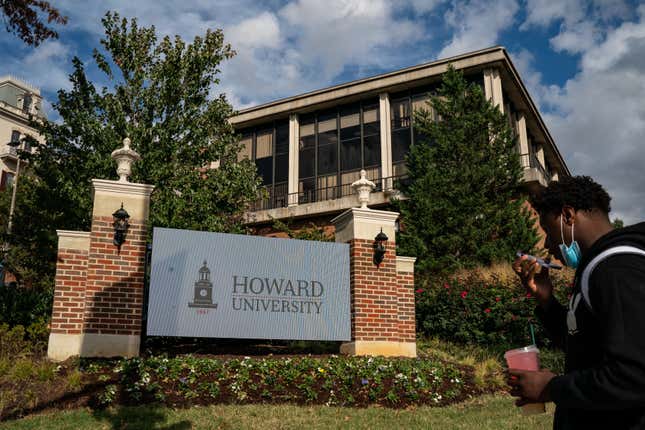
When you hear about a lawsuit claiming racial discrimination, the words white student sues historically Black University don’t typically come top of mind. But that’s exactly what’s happening in this case.
Michael Newman, a white, former law student at Howard University, sued the school for racial discrimination alleging that he’s owed $4 million in damages.
So naturally, we had to look through the lawsuit ourselves. (Spoiler alert: it’s about as cringy as expected).
The story starts off pretty normal. Newman was accepted into Howard Law School and even got a substantial scholarship.
Then, according to the lawsuit, things started to go left. Newman decides he wants to be the questions guy. For example, he asks why “Black voters didn’t question turning to the government for solutions?” He also tells classmates that, unlike Black people, he doesn’t think government solves every problem.
According to Newman’s lawsuit, his classmates then kick him out of their group chat. But naturally, he does not take the hint. In Zoom class, Newman compares being a white person at an HBCU to being Black at a predominantly white university. He tells that class that he feels “utterly disenfranchised.”
These are just the incidents that Newman mentions. But at least the way he tells it, his classmates are pretty sick of him at this point. Newman claims the other students ostracized him, so he stopped speaking up in class.
The silence thing didn’t last super long. Newman decided to share a letter with his entire class about how they mistreated him and needed to learn how to communicate better with white people. And to top it off; he sent them a link to the documentary Uncle Tom.
At this point, people are more than a little suspicious of him. And, according to the lawsuit, someone decided to check his private Twitter. Lo and behold, he’d posted an infamous photo of a formerly enslaved person with scars on his back with the caption, “but we don’t know what he did before the picture was taken?”
Newman maintains that the photo was posted ironically.
I’m not going to go through the entire lawsuit with you all (we do have to add that several of his classmates allegedly dubbed him “Mayo King.”) But suffice it to say Newman’s relationship with his classmates did not improve, especially after he sent two additional letters to the school’s listserv (against school policy) about the “discrimination” he faced.
According to the filing, the straw that broke the camel’s back for Howard seems to be when he emailed several students news reports on another student’s death, questioning whether she’d died from the COVID-19 vaccine.
After a disciplinary hearing, Newman was expelled.
Now, Newman is suing the school under the Civil Rights Act of 1964, alleging that the school discriminated against him and treated him differently because he was white. (He also wants damages for being kicked out of the group chat).
For their part, Howard is not co-signing Newman’s story. “[Howard] is prepared to vigorously defend itself in this lawsuit as the claims provide a one-sided and self-serving narrative of the events leading to the end of the student’s enrollment at the University,” said Frank Tramble, vice president, and chief communications officer for Howard University, according to the New York Post.
But let’s face it; even if everything Newman wrote was 100 percent accurate, it still doesn’t look great.
Newman isn’t the first, and he certainly won’t be the last white student to sue over “reverse racism.” But like in previous cases, we’re not sure it’s worth the embarrassing details these types of lawsuits tend to reveal.

